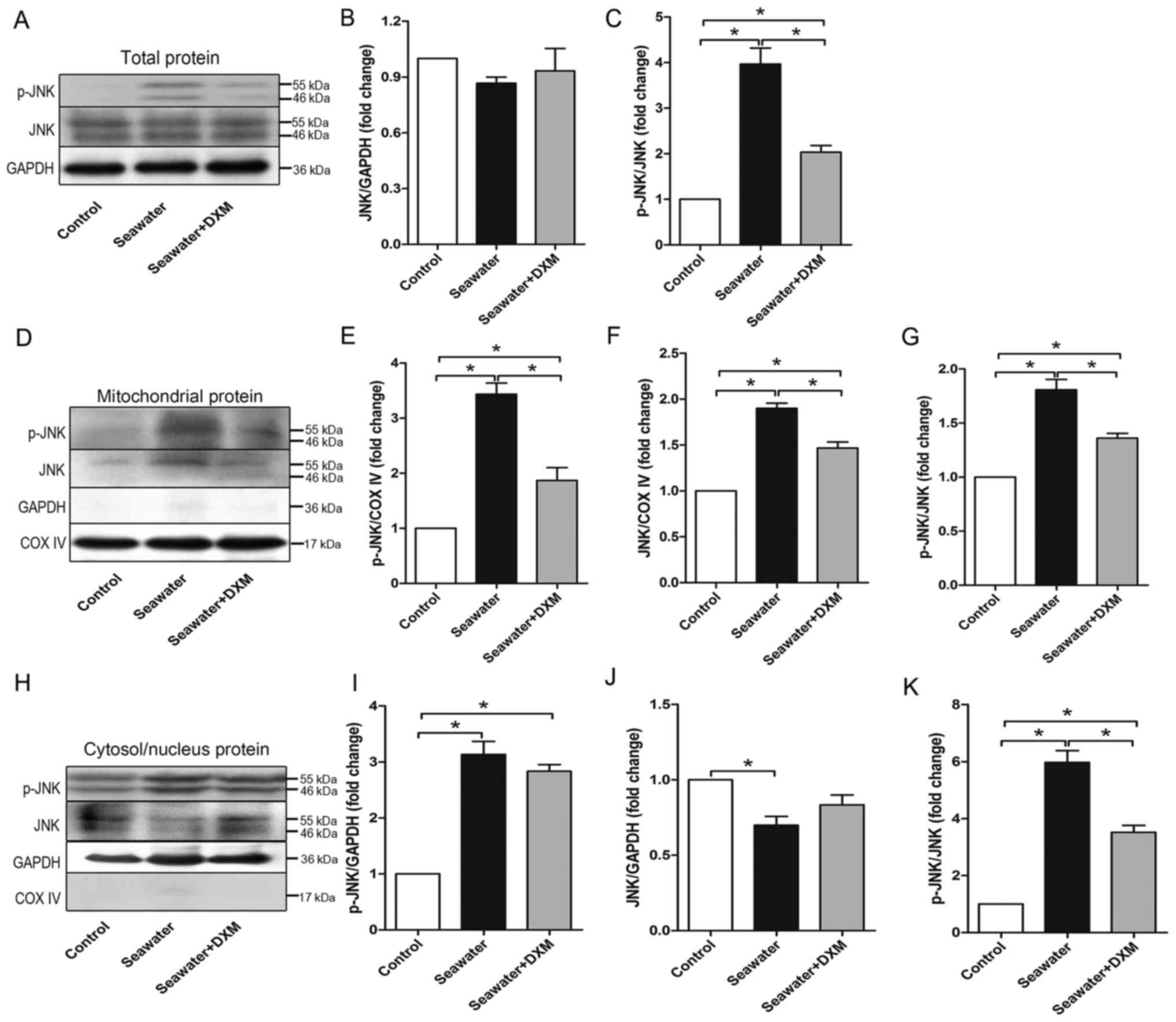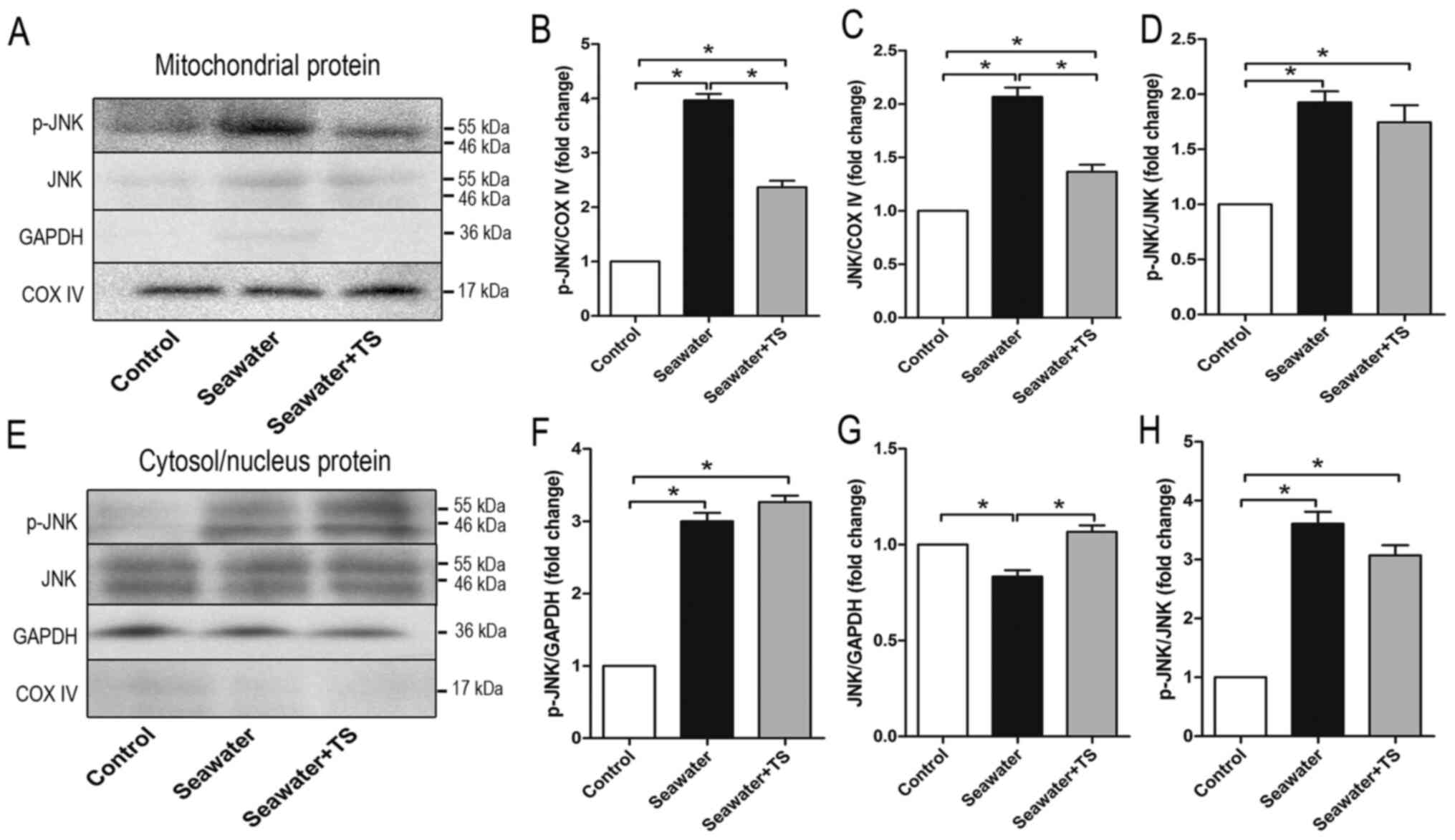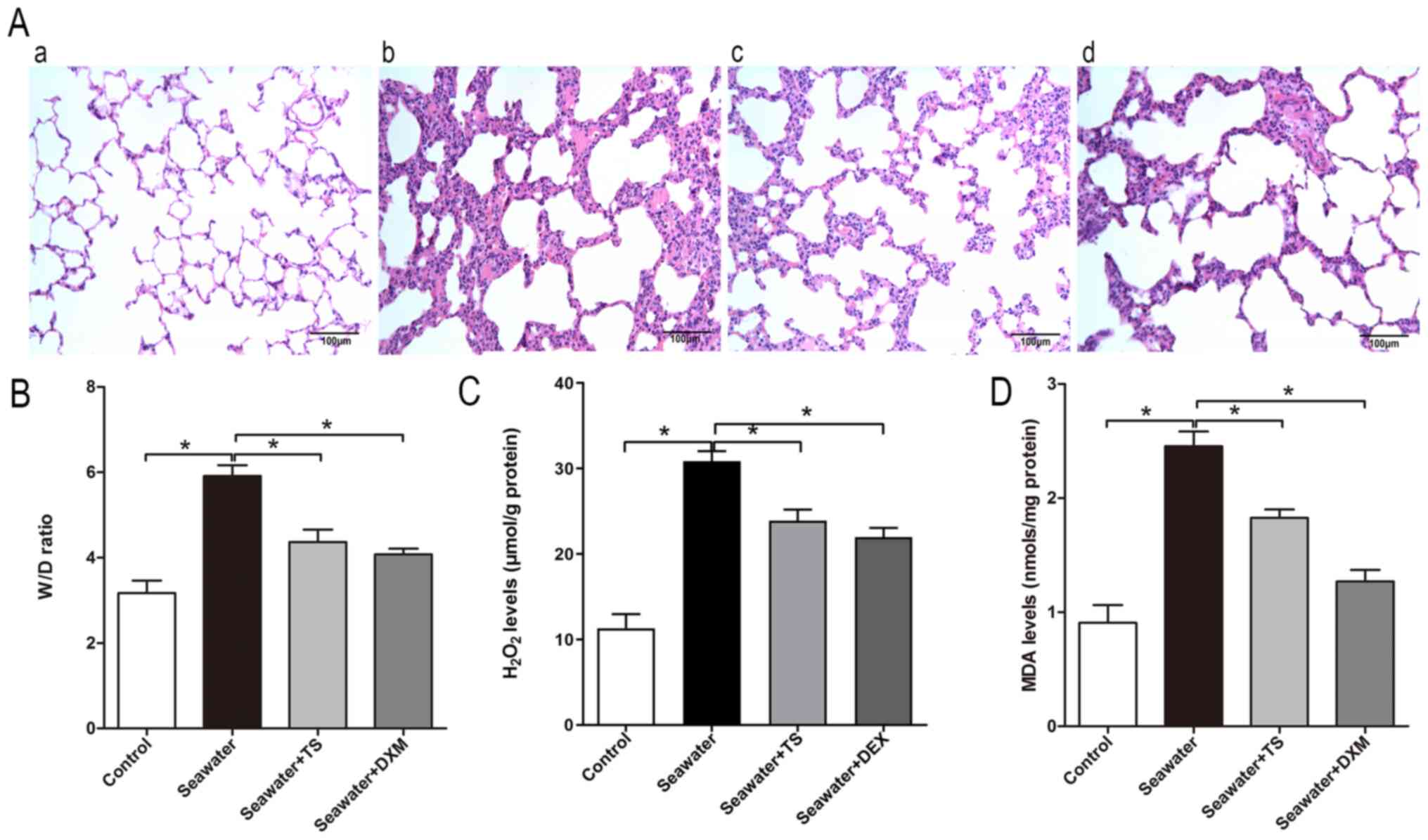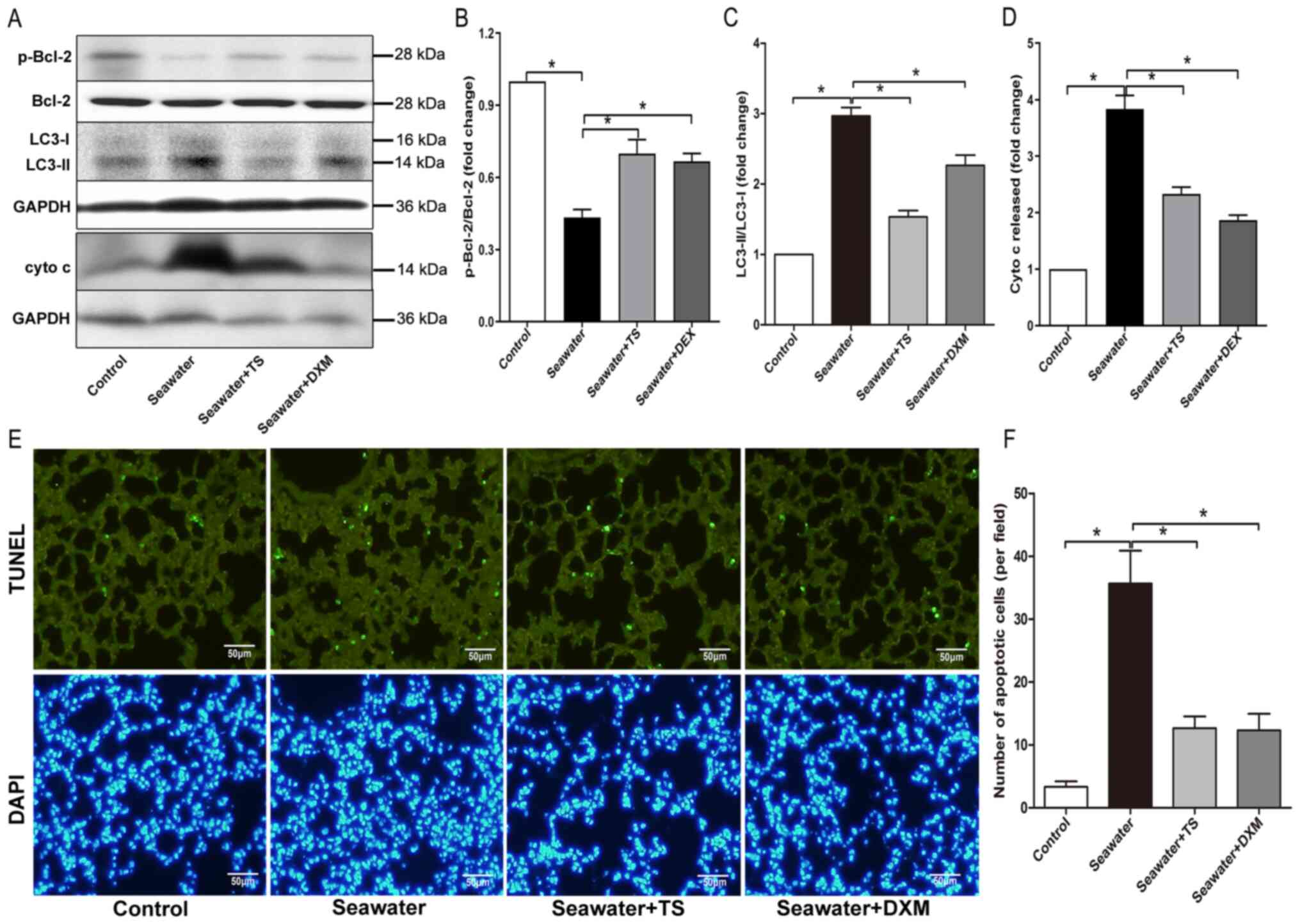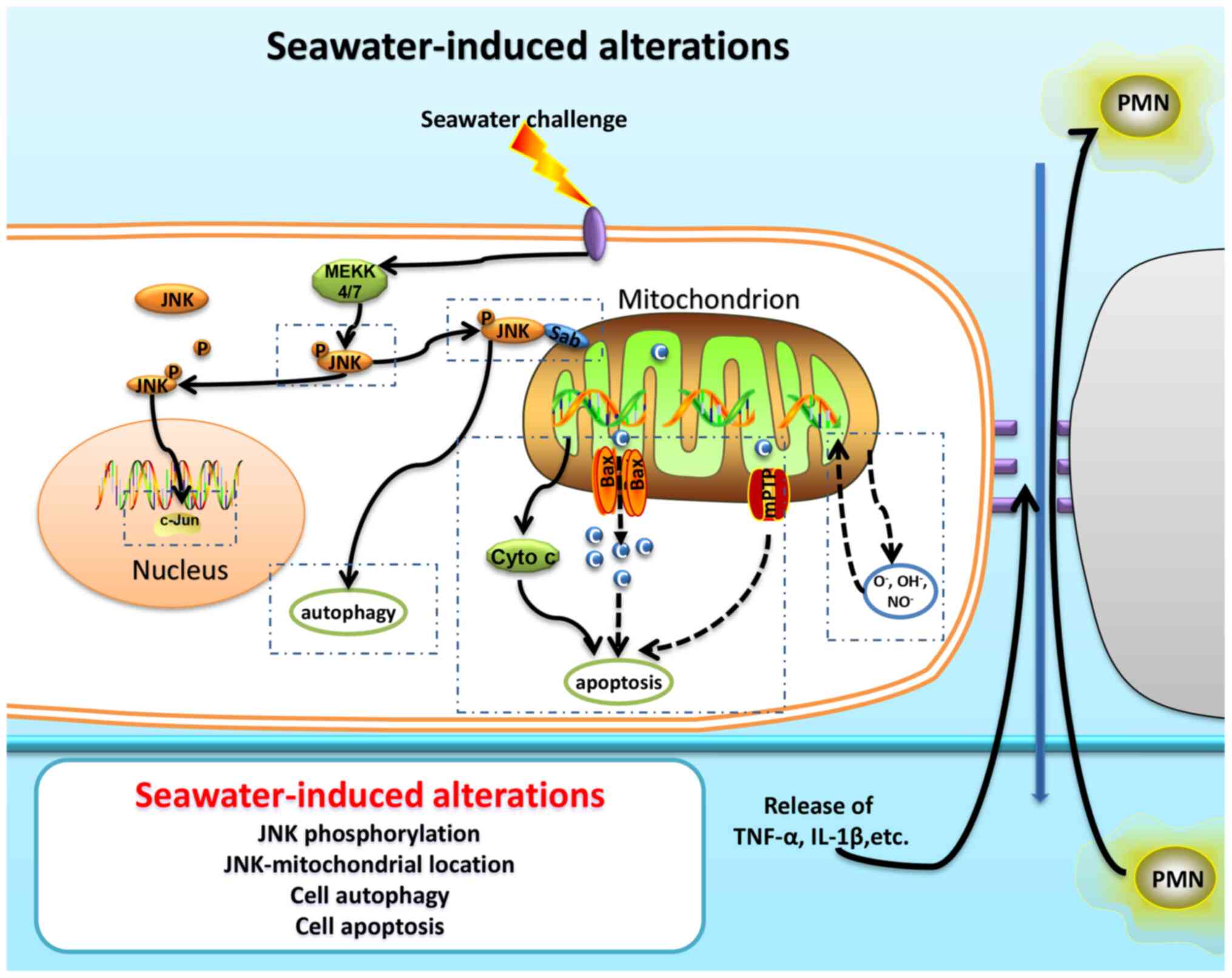|
1
|
Musi CA, Agro G, Santarella F, Iervasi E
and Borsello T: JNK3 as therapeutic target and biomarker in
neurodegenerative and neurodevelopmental brain diseases.
Cells-Basel. 9:21902020. View Article : Google Scholar : PubMed/NCBI
|
|
2
|
Tan J, Gao W, Yang W, Zeng X, Wang L and
Cui X: Isoform-specific functions of c-Jun N-terminal kinase 1 and
2 in lung ischemia-reperfusion injury through the c-Jun/activator
protein-1 pathway. J Thorac Cardiovasc Surg. 2020. View Article : Google Scholar
|
|
3
|
Chen M, Sun J, Lu C, Chen X, Ba H, Lin Q,
Cai J and Dai J: The impact of neuronal Notch-1/JNK pathway on
intracerebral hemorrhage-induced neuronal injury of rat model.
Oncotarget. 7:73903–73911. 2016. View Article : Google Scholar : PubMed/NCBI
|
|
4
|
Wang H, Zhong L, Mi S, Song N, Zhang W and
Zhong M: Tanshinone IIA prevents platelet activation and
down-regulates CD36 and MKK4/JNK2 signaling pathway. BMC Cardiovasc
Disord. 20:812020. View Article : Google Scholar : PubMed/NCBI
|
|
5
|
Desai S, Laskar S and Pandey BN: Autocrine
IL-8 and VEGF mediate epithelial-mesenchymal transition and
invasiveness via p38/JNK-ATF-2 signalling in A549 lung cancer
cells. Cell Signal. 25:1780–1791. 2013. View Article : Google Scholar : PubMed/NCBI
|
|
6
|
Ngoei KR, Catimel B, Church N, Lio DS,
Dogovski C, Perugini MA, Watt PM, Cheng HC, Ng DC and Bogoyevitch
MA: Characterization of a novel JNK (c-Jun N-terminal kinase)
inhibitory peptide. Biochem J. 434:399–413. 2011. View Article : Google Scholar : PubMed/NCBI
|
|
7
|
Matsui Y, Kuwabara T, Eguchi T, Nakajima K
and Kondo M: Acetylation regulates the MKK4-JNK pathway in T cell
receptor signaling. Immunol Lett. 194:21–28. 2018. View Article : Google Scholar : PubMed/NCBI
|
|
8
|
Chambers JW, Pachori A, Howard S, Iqbal S
and LoGrasso PV: Inhibition of JNK mitochondrial localization and
signaling is protective against ischemia/reperfusion injury in
rats. J Biol Chem. 288:4000–4011. 2013. View Article : Google Scholar : PubMed/NCBI
|
|
9
|
Xu J, Qin X, Cai X, Yang L, Xing Y, Li J,
Zhang L, Tang Y, Liu J, Zhang X and Gao F: Mitochondrial JNK
activation triggers autophagy and apoptosis and aggravates
myocardial injury following ischemia/reperfusion. Biochim Biophys
Acta. 1852:262–270. 2015. View Article : Google Scholar : PubMed/NCBI
|
|
10
|
Yabu T, Shiba H, Shibasaki Y, Nakanishi T,
Imamura S, Touhata K and Yamashita M: Stress-induced ceramide
generation and apoptosis via the phosphorylation and activation of
nSMase1 by JNK signaling. Cell Death Differ. 22:258–273. 2015.
View Article : Google Scholar : PubMed/NCBI
|
|
11
|
Wiltshire C, Matsushita M, Tsukada S,
Gillespie DA and May GH: A new c-Jun N-terminal kinase
(JNK)-interacting protein, Sab (SH3BP5), associates with
mitochondria. Biochem J. 367:577–585. 2002. View Article : Google Scholar : PubMed/NCBI
|
|
12
|
Win S, Than TA, Le BH, Garcia-Ruiz C,
Fernandez-Checa JC and Kaplowitz N: Sab (Sh3bp5) dependence of JNK
mediated inhibition of mitochondrial respiration in palmitic acid
induced hepatocyte lipotoxicity. J Hepatol. 62:1367–1374. 2015.
View Article : Google Scholar : PubMed/NCBI
|
|
13
|
Li Y, Zeng Z, Li Y, Huang W, Zhou M, Zhang
X and Jiang W: Angiotensin-converting enzyme inhibition attenuates
lipopolysaccharide-induced lung injury by regulating the balance
between angiotensin-converting enzyme and angiotensin-converting
enzyme 2 and inhibiting mitogen-activated protein kinase
activation. Shock. 43:395–404. 2015. View Article : Google Scholar : PubMed/NCBI
|
|
14
|
Hui Z, Jie H and Fan GH: Expression of
DUSP12 reduces lung vascular endothelial cell damage in a murine
model of lipopolysaccharide-induced acute lung injury via the
apoptosis signal-Regulating Kinase 1 (ASK1)-Jun N-Terminal Kinase
activation (JNK) pathway. Med Sci Monit. 27:e9304292021. View Article : Google Scholar : PubMed/NCBI
|
|
15
|
Zhang ZK, Zhou Y, Cao J, Liu DY and Wan
LH: Rosmarinic acid ameliorates septic-associated mortality and
lung injury in mice via GRP78/IRE1alpha/JNK pathway. J Pharm
Pharmacol. Mar 16–2021.(Epub ahead of print). View Article : Google Scholar
|
|
16
|
Liu SH, Lu TH, Su CC, Lay IS, Lin HY, Fang
KM, Ho TJ, Chen KL, Su YC, Chiang WC and Chen YW: Lotus leaf
(Nelumbo nucifera) and its active constituents prevent inflammatory
responses in macrophages via JNK/NF-kappaB signaling pathway. Am J
Chin Med. 42:869–889. 2014. View Article : Google Scholar : PubMed/NCBI
|
|
17
|
Yu J, Wang Y, Li Z, Dong S, Wang D, Gong
L, Shi J, Zhang Y, Liu D and Mu R: Effect of Heme Oxygenase-1 on
Mitofusin-1 protein in LPS-induced ALI/ARDS in rats. Sci Rep.
6:365302016. View Article : Google Scholar : PubMed/NCBI
|
|
18
|
Suresh K, Servinsky L, Reyes J, Baksh S,
Undem C, Caterina M, Pearse DB and Shimoda LA: Hydrogen
peroxide-induced calcium influx in lung microvascular endothelial
cells involves TRPV4. Am J Physiol Lung Cell Mol Physiol.
309:L1467–L1477. 2015. View Article : Google Scholar : PubMed/NCBI
|
|
19
|
Wang K, Chen Y, Zhang P, Lin P, Xie N and
Wu M: Protective features of autophagy in pulmonary infection and
inflammatory diseases. Cells Basel. 8:1232019. View Article : Google Scholar : PubMed/NCBI
|
|
20
|
Jackson MV, Morrison TJ, Doherty DF,
McAuley DF, Matthay MA, Kissenpfennig A, O'Kane CM and
Krasnodembskaya AD: Mitochondrial transfer via tunneling nanotubes
is an important mechanism by which mesenchymal stem cells enhance
macrophage phagocytosis in the in vitro and in vivo models of ARDS.
Stem Cells. 34:2210–2223. 2016. View Article : Google Scholar : PubMed/NCBI
|
|
21
|
Islam MN, Das SR, Emin MT, Wei M, Sun L,
Westphalen K, Rowlands DJ, Quadri SK, Bhattacharya S and
Bhattacharya J: Mitochondrial transfer from bone-marrow-derived
stromal cells to pulmonary alveoli protects against acute lung
injury. Nat Med. 18:759–765. 2012. View Article : Google Scholar : PubMed/NCBI
|
|
22
|
Gomzikova MO, James V and Rizvanov AA:
Mitochondria donation by mesenchymal stem cells: Current
understanding and mitochondria transplantation strategies. Front
Cell Dev Biol. 9:6533222021. View Article : Google Scholar : PubMed/NCBI
|
|
23
|
Zhang M, Gao Y, Zhao W, Yu G and Jin F:
ACE-2/ANG1-7 ameliorates ER stress-induced apoptosis in seawater
aspiration-induced acute lung injury. Am J Physiol Lung Cell Mol
Physiol. 315:L1015–L1027. 2018. View Article : Google Scholar : PubMed/NCBI
|
|
24
|
National Research Council (US) Committee
for the Update of the Guide for the Care and Use of Laboratory
Animals, . Guide for the Care and Use of Laboratory Animals. 8th
edition. National Academies Press (US); Washington, DC: 2011
|
|
25
|
Li C, Liu M, Bo L, Liu W, Liu Q, Chen X,
Xu D, Li Z and Jin F: NFAT5 participates in seawater
inhalationinduced acute lung injury via modulation of NF-kappaB
activity. Mol Med Rep. 14:5033–5040. 2016. View Article : Google Scholar : PubMed/NCBI
|
|
26
|
Hanawa N, Shinohara M, Saberi B, Gaarde
WA, Han D and Kaplowitz N: Role of JNK translocation to
mitochondria leading to inhibition of mitochondria bioenergetics in
acetaminophen-induced liver injury. J Biol Chem. 283:13565–13577.
2008. View Article : Google Scholar : PubMed/NCBI
|
|
27
|
Li X, Wang Y, Xiong Y, Wu J, Ding H, Chen
X, Lan L and Zhang H: Galangin induces autophagy via deacetylation
of LC3 by SIRT1 in HepG2 cells. Sci Rep. 6:304962016. View Article : Google Scholar : PubMed/NCBI
|
|
28
|
Xu HD and Qin ZH: Beclin 1, Bcl-2 and
autophagy. Adv Exp Med Biol. 1206:109–126. 2019. View Article : Google Scholar : PubMed/NCBI
|
|
29
|
Rubenfeld GD, Caldwell E, Peabody E,
Weaver J, Martin DP, Neff M, Stern EJ and Hudson LD: Incidence and
outcomes of acute lung injury. N Engl J Med. 353:1685–1693. 2005.
View Article : Google Scholar : PubMed/NCBI
|
|
30
|
Fan E, Brodie D and Slutsky AS: Acute
respiratory distress syndrome: Advances in diagnosis and treatment.
JAMA. 319:698–710. 2018. View Article : Google Scholar : PubMed/NCBI
|
|
31
|
Farkhondeh T, Mehrpour O, Buhrmann C,
Pourbagher-Shahri AM, Shakibaei M and Samarghandian S:
Organophosphorus compounds and MAPK signaling pathways. Int J Mol
Sci. 21:42582020. View Article : Google Scholar : PubMed/NCBI
|
|
32
|
Han X, Liu C, Zhang K, Guo M, Shen Z, Liu
Y, Zuo Z, Cao M and Li Y: Calpain and JNK pathways participate in
isoflurane-induced nucleus translocation of apoptosis-inducing
factor in the brain of neonatal rats. Toxicol Lett. 285:60–73.
2018. View Article : Google Scholar : PubMed/NCBI
|
|
33
|
Li Y, Xu M, Ding X, Yan C, Song Z, Chen L,
Jian Y, Tang G, Tang C, Di Y, et al: Protein kinase C controls
lysosome biogenesis independently of mTORC1. Nat Cell Biol.
18:1065–1077. 2016. View Article : Google Scholar : PubMed/NCBI
|
|
34
|
Win S, Than TA, Fernandez-Checa JC and
Kaplowitz N: JNK interaction with Sab mediates ER stress induced
inhibition of mitochondrial respiration and cell death. Cell Death
Dis. 5:e9892014. View Article : Google Scholar : PubMed/NCBI
|
|
35
|
Chambers JW, Howard S and LoGrasso PV:
Blocking c-Jun N-terminal kinase (JNK) translocation to the
mitochondria prevents 6-hydroxydopamine-induced toxicity in vitro
and in vivo. J Biol Chem. 288:1079–1087. 2013. View Article : Google Scholar : PubMed/NCBI
|
|
36
|
Zhao Y and Herdegen T: Cerebral ischemia
provokes a profound exchange of activated JNK isoforms in brain
mitochondria. Mol Cell Neurosci. 41:186–195. 2009. View Article : Google Scholar : PubMed/NCBI
|
|
37
|
Chambers JW, Cherry L, Laughlin JD,
Figuera-Losada M and Lograsso PV: Selective inhibition of
mitochondrial JNK signaling achieved using peptide mimicry of the
Sab kinase interacting motif-1 (KIM1). ACS Chem Biol. 6:808–818.
2011. View Article : Google Scholar : PubMed/NCBI
|















